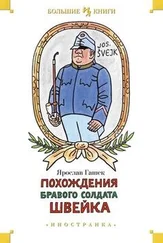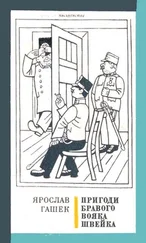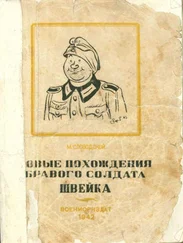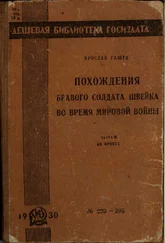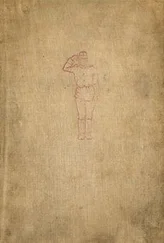| I'll never survive the shame.' |
Такого позора я не переживу. |
| The late lamented Ferdinand played an odd trick on the fourth detainee, a man of sterling character and blameless reputation. |
Удивительную штуку сыграл покойник Фердинанд с четвертым арестованным, о котором следует сказать, что это был человек открытого характера и безупречной честности. |
| For two whole days he had avoided any talk about Ferdinand until in the evening in the cafe, while playing mari:i1P and trumping the king of spades with the seven of clubs, he said: |
Целых два дня он избегал всяких разговоров о Фердинанде и только вечером в кафе за "марьяжем", побив трефового короля козырной бубновой семеркой, сказал: |
| ' Seven pips like at Sarajevo.' |
- Семь пулек, как в Сараеве! |
| The fifth man, who as he said himself was detained there' because of that murder of His Imperial Highness at Sarajevo', was so scared that his hair and beard were still standing on end and his head reminded one of a stable pinscher. |
У пятого, который, как он сам признался, сидит "из-за этого самого убийства эрцгерцога в Сараеве", еще сегодня от ужаса волосы стояли дыбом и была взъерошена борода, так что его голова напоминала морду лохматого пинчера. |
| This man had not uttered a single word in the restaurant where he had been arrested. He had not even read the newspapers about the murder of Ferdinand and was sitting alone at the table, when a gentleman came up to him, sat down opposite him and said to him quickly: |
Он был арестован в ресторане, где не промолвил ни единого слова, даже не читал газет об убийстве Фердинанда: он сидел у стола в полном одиночестве, как вдруг к нему подошел какой-то господин, сел напротив и быстро спросил: |
| 'Have you read it?' |
- Читали об этом? |
| 'No.' |
- Не читал. |
| 'Do you know about it?' |
- Знаете про это? |
| 'No.' |
- Не знаю. |
| 'And do you know what it's about?' |
- А знаете, в чем дело? |
| 'No, I'm not interested.' |
- Не знаю и знать не желаю. |
| 'But you ought to be interested.' |
- Все-таки это должно было бы вас интересовать. |
| ' I don't know what I ought to be interested in. |
- Не знаю, что для меня там интересного. |
| I just smoke my cigar, drink my few glasses, have my supper and don't read the newspapers. |
Я выкурю сигару, выпью несколько кружек пива и поужинаю. А газет не читаю. |
| The newspapers tell lies. |
Газеты врут. |
| Why should I get excited?' |
Зачем себе нервы портить? |
| 'And so you're not even interested in the murder at Sarajevo then?' |
- Значит, вас не интересует даже это сараевское убийство? |
| 'I'm not interested in any murder at all, whether it's at Prague, Vienna, Sarajevo or London. |
- Меня вообще никакие убийства не интересуют. Будь то в Праге, в Вене, в Сараеве или в Лондоне. |
| For that there are authorities, courts and police. |
На то есть соответствующие учреждения, суды и полиция. |
| If at any time anywhere they kill anybody it only serves him right. |
Если кого где убьют, значит, так ему и надо. |
| Why is he such a bloody careless fool to let himself get killed ? ' Those were his last words in this conversation. |
Не будь болваном и не давай себя убивать. На том разговор и окончился. |
| From that moment he went on repeating aloud at intervals of five minutes: |
С этого момента он через каждые пять минут только громко повторял: |
| ' I'm innocent. I'm innocent.' |
- Я не виновен, я не виновен! |
| He screamed out these words at the gate of police headquarters; he is going to repeat them when he is transferred to the criminal court in Prague; and with these words he will enter his prison cell. |
Эти слова он выкрикивал, когда вошел в ворота полицейского управления. И эти же слова он будет повторять, когда его повезут в пражский уголовный суд. С этими словами он войдет и в свою тюремную камеру. |
| When Svejk had heard all these dreadful conspiratorial tales he thought it right to explain to the others the utter hopelessness of their position. |
Выслушав эти страшные истории заговорщиков, Швейк счел уместным разъяснить заключенным всю безнадежность их положения. |
| 'We're all of us in a nasty jam,' he began his words of comfort. |
- Наше дело дрянь, - начал он слова утешения. |
| 'You're not right when you say that nothing can happen to you or any of us. |
- Неправда, будто вам, всем нам ничего за это не будет. |
| What have we got the police for except to punish us for talking out of turn? |
На что же тогда полиция, как не для того, чтобы наказывать нас за наш длинный язык? |
| If the times are so dangerous that archdukes get shot, no one should be surprised if he's carried off to police headquarters. |
Раз наступило такое тревожное время, что стреляют в эрцгерцогов, так нечего удивляться, что тебя ведут в полицию. |
| They're doing all this to make a splash, so that Ferdinand can have some publicity before his funeral. |
Все это для шика, чтобы Фердинанду перед похоронами сделать рекламу. |
| The more of us there are here, the better it'll be for us, because it'll be all the jollier. |
Чем больше нас здесь наберется, тем лучше для нас: веселее будет. |
| When I was in the army half a company of us were sometimes locked up together. |
Когда я служил на действительной службе, у нас как-то посадили полроты. |
| And how many innocent people used to be condemned! And not only in the army but in the civil courts too. |
А сколько невинных людей осуждено не только на военной службе, но и гражданскими судами! |
| I remember once a woman was sentenced for strangling her newly-born twins. |
Помню, как-то одну женщину осудили за то, что она удавила своих новорожденных близнецов. |
| Although she swore on oath that she couldn't have strangled twins, when she'd given birth to only one little girl, which she had succeeded in strangling quite painlessly, she was sentenced for double murder all the same. |
Хотя она клялась, что не могла задушить близнецов, потому что у нее родилась только одна девочка, которую ей совсем безболезненно удалось придушить, ее все-таки осудили за убийство двух человек. |
| Or that innocent gipsy in Zabehlice, who broke into a greengrocer's shop on Christmas Day in the night. He swore that he'd gone there to get warm, but it didn't help. |
Или возьмем, к примеру, того невинного цыгана из Забеглиц, что вломился в мелочную лавочку в ночь под рождество: он клялся, что зашел погреться, но это ему не помогло. |
| Once it gets into the hands of the courts it's bad. |
Уж коли попал в руки правосудия - дело плохо. |
| But that bad has to be. |
Плохо, да ничего не попишешь. |

